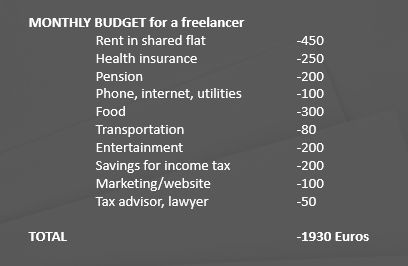Title updated Nov. 9, 2016 with my regrets. The rest of the advice still stands.
? ? ? ? ? ?
Sure, you could move to Canada, your ?socialist? neighbor to the north, if Donald Trump becomes president. But why not consider Germany, your ?socialist? (in the American sense) neighbor across the Atlantic?
Not only is Germany the land of beer, bratwurst and some pretty kick-ass soccer, it?s also the land of universal healthcare, paid parental leave, tuition-free universities ? and it?s Europe?s economic powerhouse as well, with an unemployment rate of well under 5%.
If you?re dreaming of leaving the US but unsure how to do it, here?s your game plan.

I?m an American who left the US when George Bush was re-elected. I moved to Berlin with no German, no job and no work permit ? just some savings and determination. In the last 8 years I?ve learned German, been through several dream jobs, started my own company and gotten permanent residency in Germany. And if I can do it, you can too.
- Do a cold, hard reality check.
The first, maybe biggest, hurdle is that Germany only wants you if you are a certain type of person ? for most Americans this probably means being a worker with a university degree and skills the German economy needs, or a German language or university student. You?re also going to need savings, as it?ll take some time after moving to get a residency permit, find an apartment and get settled in. Optimism, patience, grit and the love of a good challenge will not hurt.
And an important disclaimer: you won?t have access to some parts of Germany?s fabulous social system without hard work and time. You can?t just move to Germany and get on unemployment, health care is quite expensive, and if you?re working you can expect to pay a ton of taxes. But, if you contribute into the social system for several years, you?ll be able to reap the full socialist rewards. And yes, Americans do also have tuition-free access to university education (but don?t forget about living expenses!)
2. Do your research and create an action plan
Time to do some serious research ? the first step is to determine how you?re going to stay in Germany.
If you want to work, will you try to get a full-time job as an employee of a company, or will you work freelance/self-employed? (Note: these links are for Berlin ? for other cities google ?Auslnderbehrde or Auslnderamt + city?) Is the job you currently do in demand in Germany? If so, and you get a highly-paid enough job offer, you may even qualify for a blue card work permit. If not, which other marketable skills could you use to find work? For some professions (nurse/doctor, etc.) you?ll need to learn fluent German and pass difficult licensing exams or have your degree officially recognized in order to do your job in Germany, while for others (banking, insurance, etc.) you may need fluent German because it?s still a very traditional industry with mainly German-speaking clients.
The Catch-22 of work permits is that in order to get any type of work permit in Germany you?ll have to show there?s a company willing to hire you (or potential clients wanting to use your freelance/self-employed services) before you get the permit. But many companies won?t want to talk to you without a work permit.
It?s also usually not possible for US citizens to get a work permit for any type of casual work such as restaurant/caf/bar, cleaning, moving, babysitting, etc. (at least in your first years) because companies must use EU workers with preference when hiring, and it?s hard to make the claim that casual work should be given to a non-EU citizen (i.e. you).
The best advice for this daunting situation is to come here in person to look for a job, where you can use your networking skills, charm and persistence to help you ? it?s next to impossible to find a job in Germany when you?re still in the US (unless of course you are a computer programmer or management hotshot). But you can adjust your resume/CV, create a list of all the places you want to apply, and compile all your possible networking ideas so that you can hit the ground running as soon as you arrive in Germany.
New ? and super cool ? is the 6-month residency permit for qualified workers to live in Germany and look for a job. This is for university graduates only, and you can?t work while on this permit (you can only look for/apply for work), but it means you can buy yourself quite some time to find something that will get you a work permit.
Want to be a student? Excellent ? students in Germany get lots of perks like cheaper health insurance and bank accounts, reduced rates for public transportation, etc. German language students can stay in Germany for up to 1 year when enrolled in an intensive language program of 18 hours of German classes per week (downside: you can?t work on this permit). University students can work a bit on the side but you need to be accepted into a university program before coming (and you need fluent German for many programs).
Of course, these are just the most likely routes most Americans can take to residency in Germany ? dig around a bit and see if any other options match you. Once you know what you want to do here, you can put together a concrete to-do list to make your move a reality. To definitely include on your checklist: register your address as a resident of Germany (see point 6), find a job or register for school, get a residency/work permit, open a bank account, get health insurance, get a German sim card, find an apartment and figure out taxes.
3. Start saving money
You are going to need savings ? how much depends on your lifestyle and what you want to be doing in Germany. If you plan to work, it can take months to find a job and get a work permit, so you?ll need savings to live off of. It took me about 6 months to find work, get a work permit, and get my first paycheck. And if you?re a language or university student, you?ll need roughly 8000 Euros set aside as proof you can afford to live here for a year.
As an example, a totally made-up but realistic budget for 1 month in Berlin as a freelancer might look something like this:

Note that when you first move here you?ll generally also likely need 2?3 months? rent as a deposit on your apartment.
4. Start learning German
Of course you can live and work in Berlin without German but you will be stuck in the expat bubble and unable to solve a lot of your own everyday problems if you don?t speak the language. In other cities, speaking German can be even more crucial. It takes years to learn a language fluently, no matter what some people claim on the interwebs. Start now with an app like Duolingo, Babbel or Busuu? you?ll be surprised how far a few hundred words and phrases can get you once you arrive.
5. Plan a date to leave.
It?s best to start planning 6?12 months before you want to move abroad, and time of year can matter. Many people (i.e. HR people) are away on vacation in July, August and December, so arriving then to apply for jobs may not be a great move. We?ve generally heard that January-May and September-October are the best months for getting hired. If you are a university student, you need time to apply and be accepted into a program, and you?ll want to arrive at least a few weeks before the start of a semester.
As an American you have 90 days to stay in Germany visa-free as a tourist (the whole Schengen Zone actually ? so careful if you were visiting other countries before going to Germany). In other words, you have 90 days to find a job/school/etc. and apply for a residency permit before you have to leave the country, so count your days carefully and use them wisely.
6. Find a short-term place to stay
Book a short-term place for the first 1?2 months (or longer) as it sucks to stay in a hotel or hostel, where you?ll feel pressure to move out and find something ?real? asap. It can take a lot of time and money to find a good apartment in Germany, so help ease the pressure on yourself by ensuring you have a comfortable place lined up now. There are many furnished apartment rental websites out there, and booking for a month or longer often gets you a discounted price.
Definitely make sure before booking that you will be able to officially register your address at this location (called ?Anmeldung?), because that is the very important first bureaucratic step you?ll have to complete.
7. Pack up and move!
Give away your stuff and say goodbye to Trumpland! Don?t forget to bring: your original university degrees (yes, the originals) and transcripts, any certificates for computer, language, etc. courses, letters of reference from any past jobs you?ve worked, your birth and marriage certificates.
8. Work through your checklist ? job, work permit, insurance, etc.
Holy shit! You are in Germany! Day 1: Have a beer and a bratwurst, and take a deep breath. You made it! Day 2: Time to work through that checklist you made.
9. Make friends/support network
Having people and places where you can ask your questions and get advice is essential to help you make it through the toughest times. Networking is also an excellent way to find out about companies that are hiring, hear about a newly-available apartment, and meet potential business partners, roommate, best friends and spouses. For a start, try expat groups on facebook, Meet up events, or a group like Internations.
Try to interact with non-expats as much as you can ? volunteering is a great way to meet some Germans, practice the language, and make ties to your local community. Give Something Back to Berlin is a great local group ? for other cities try searching ?Ehrenamt + city.?
10. Stick around and make long-term plans
The first six months in a new country are often the hardest ? try to stick it out at least this long before you vow, ?I hate this, I?m leaving!? or I?m NEVER going home.? If you?re feeling like giving up, set a deadline for yourself ? ?I?m going to give it one more month and I?ll decide on day X.?
Once you?ve decided you do want to stay, it?s time to think long-term ? taxes, pension planning, etc. One reason why this matters ? you?ll generally be eligible for permanent residency (?Niederlassungserlaubnis?) after 5 years of work permits in Germany, but only if you have also paid into the pension system for 60 months (or have equivalent private pension savings).
One last tip ? keep insanely organized. It?s Germany. You need to keep all your important paperwork (bank statements, tax documents, your company?s invoices, etc.) for 10 years. It?s best to just save every shred of paper that could possibly be important, as you never know when someone will ask for proof of something from 5 years ago. Write down deadlines carefully and set yourself a reminder for a month or two beforehand ? for example, you?ll want to start collecting paperwork and schedule an appointment for your residency permit renewal several months before the expiration date is up.
Finally, don?t worry. You will mess up ? maybe a lot ? but Germans are usually forgiving if it was an honest mistake and you attempt to fix the problem asap. Remember ? there are over 100,000 Americans living in Germany. If they figured it out, you can too.
? ? ? ? ? ? ? ?
Need help moving to Germany? Expath exists to help you figure it all out. Founded by 2 Americans, we can help you make a realistic and concrete game plan of exactly what you need to do to get here. Contact us at [email protected].


